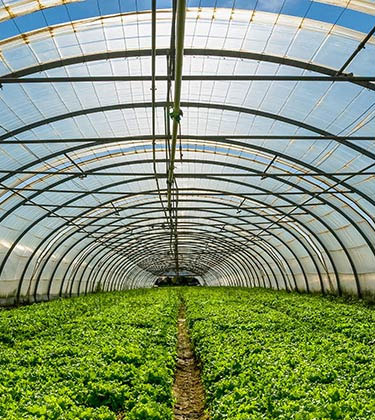Sustainable Ag and Food
- Home
- Sustainable Ag and Food
 With 27 million acres of land dedicated to farming (about 75 percent of the state’s total land area), Illinois is a major agricultural state. The state’s 72,000+ jobs generate more than $19B annually, with farms producing a wide array of crops, including specialty crops, and about 25% focused on meat and dairy production. Illinois farms also produce a significant proportion of the nation’s ethanol, producing 678M gallons annually, more than any other state. Additionally, there are over 2,600 food manufacturing companies located in Illinois, making the state one of the largest concentrations of food-related businesses in the world.
With 27 million acres of land dedicated to farming (about 75 percent of the state’s total land area), Illinois is a major agricultural state. The state’s 72,000+ jobs generate more than $19B annually, with farms producing a wide array of crops, including specialty crops, and about 25% focused on meat and dairy production. Illinois farms also produce a significant proportion of the nation’s ethanol, producing 678M gallons annually, more than any other state. Additionally, there are over 2,600 food manufacturing companies located in Illinois, making the state one of the largest concentrations of food-related businesses in the world.
The term “sustainable agriculture” was defined in 1977 by the USDA as an integrated system of environmentally-friendly methods of farming that allow the production of crops or livestock in a manner that prevents adverse effects to soil, water, biodiversity, surrounding or downstream resources—as well as to those working or living on the farm or in neighboring areas. The goal of sustainable agriculture is to meet society’s food and textile needs in the present without compromising the ability of future generations to meet their own needs.
The sustainable food sector refers to food that is locally grown, sustainably produced, fresher, more nutritious, better tasting, travels fewer miles and causes fewer carbon emissions. It encompasses all aspects of local, urban, and organic food production with many Illinois farmers selling their products at farm stands, through Community Supported Agriculture (CSA) programs, or at local farmer’s markets. Over 3,600 Illinois farms are established as specialty crop farms utilizing more than 81,250 acres to produce over 472 million dollars in sales annually within Illinois.
Illinois Community Colleges and Sustainable Agriculture and Food
Changes in consumer demand for food, food experience, food security, eating habits and lifestyles have opened the door to a host of economic and agricultural career opportunities for those who grow, package, market and distribute high-profit specialty and artisanal items. Illinois community colleges are working as part of the framework needed to grow, harvest, transport, market, sell, prepare, and serve healthy, locally grown, sustainable food. To meet this demand, Illinois community colleges offer programs on sustainable agriculture principles for rural and urban farmers as well as career pathway education for food entrepreneurs and food processors. In addition to education and training, colleges are:
- Using campus facilities as living laboratories to demonstrate innovative technology and best practices such as water-conserving irrigation, energy-efficient greenhouses, cold weather crops and permaculture.
- Promoting the health benefits of locally grown produce to their students as part of campus health and wellness.
- Working with their local communities to offer community garden plots and hosting farmers’ markets.
- Incorporating locally grown food into college dining service menus and campus catering services.
- Initiating compost programs to reduce waste on college campuses.
- Including local and sustainable foods in culinary arts curricula.
Sustainable Agriculture Certificate
College of Lake County
Sustainable Agriculture Technology Certificate
Triton College
Sustainable Agriculture Technology Degree
Triton College
Sustainable Food Production Certificate
Triton College
Value Added Food Certificate
Lincoln Land Community College
Introduction to Regenerative & Sustainable Agriculture
In addition, the IGEN Career Pathways Consortium created and re-designed over 30+ green industry certificate and degree programs at 17 Illinois community colleges through a Department of Labor’s TAACCT career pathways grant. Courses were created using open-source materials and are intended to be shared as a free resource for other educational institutions or programs. College faculty and staff who are interested in exploring course content in a variety of green career fields can access these materials via Skills Commons, a repository created by the U.S. Department of Labor.
